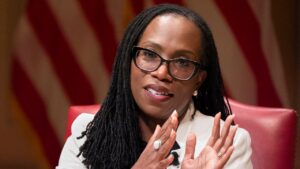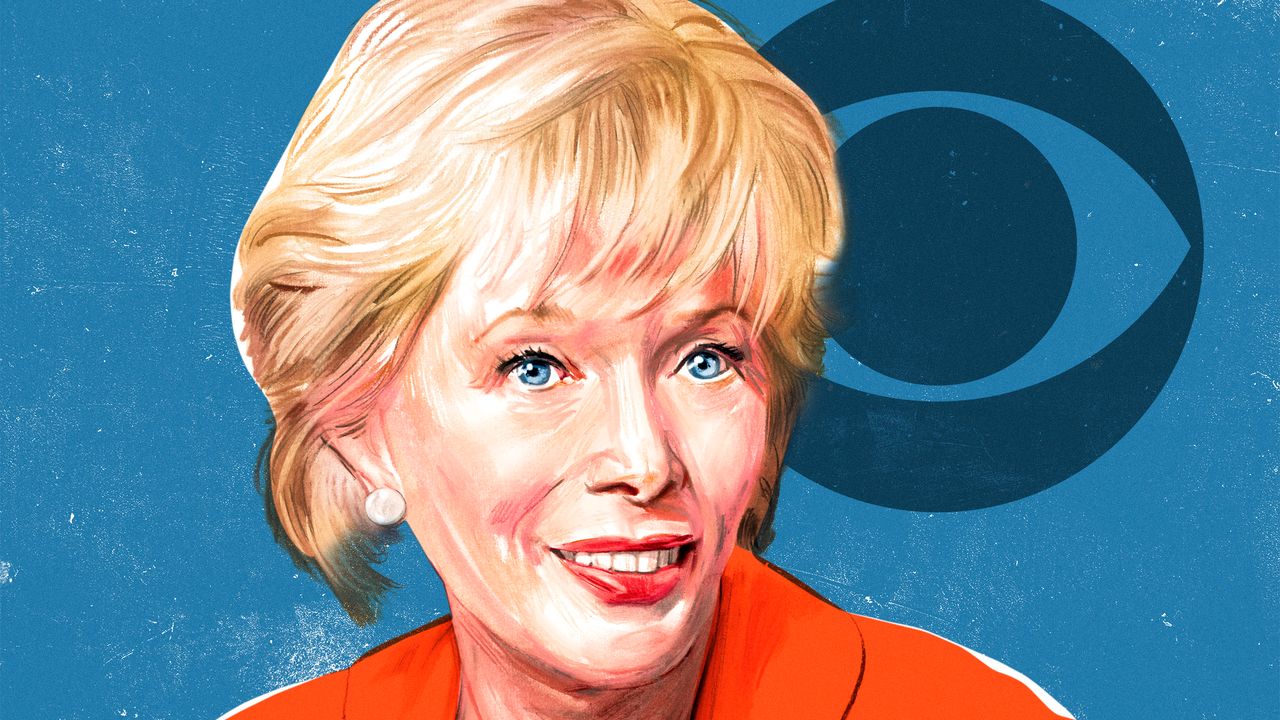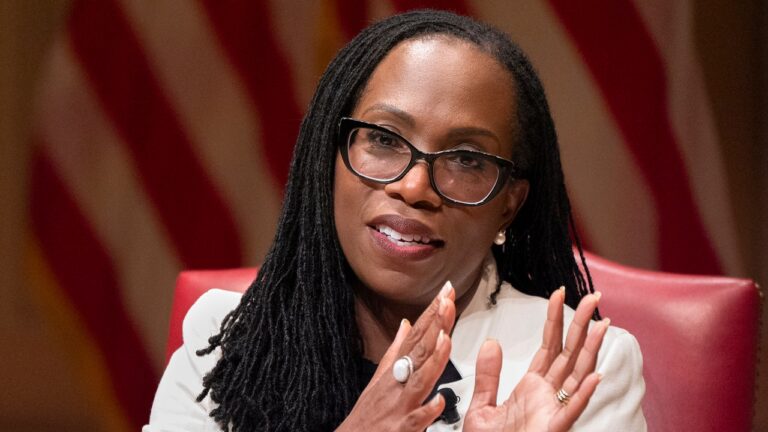Listen and subscribe: Apple | Spotify | Google | Wherever You Listen
Sign up for our daily newsletter to get the best of The New Yorker in your inbox.
Lesley Stahl joined CBS News just in time to cover the Watergate scandal, and went on to become its White House correspondent for three Presidential Administrations. Since 1991, she has been a correspondent for “60 Minutes,” and has reported, in recent years, from Afghanistan, Rwanda, Taiwan, and Bhutan. Stahl is, with thirteen Emmy awards, the senior journalist at the most prestigious news program in television, and, as its owners move to placate the Trump Administration, she is witness to its moment of greatest peril.
CBS is owned by Paramount Global. Paramount’s controlling shareholder, Shari Redstone, badly wants to merge the company with Skydance, an entertainment enterprise backed by one of the wealthiest people in the world, the pro-Trump software magnate Larry Ellison. The deal could bring her billions of dollars. One problem: Donald Trump has sued “60 Minutes” for twenty billion dollars. He and his legal team claim—to the derision of nearly all legal experts—that the program edited an interview with Kamala Harris in a way that somehow jeopardized his candidacy in the 2024 election. Rather than challenge Trump, Redstone wants to settle the suit, the better to soothe the President amid pending F.C.C. approval of the multibillion-dollar deal. On Wednesday, the Wall Street Journal reported that Paramount had offered Trump fifteen million dollars to settle, but the President’s team turned the offer down, insisting on at least twenty-five million, and an apology.
In recent weeks, both Bill Owens, the executive producer of “60 Minutes,” and Wendy McMahon, the C.E.O. of CBS News, resigned from their jobs, citing disagreements with corporate leadership. Among media executives, Redstone is not the only one who seems to be taking stock of her interests and deciding to accommodate the President rather than stand up for the journalists in her employ. Similarly, Jeff Bezos has made moves at the Washington Post that seem to cater to Trump’s interests and protect Amazon, the primary source of his fortune. The executive leadership of Disney, which owns ABC, settled a suit with Trump, who had been displeased with the way George Stephanopoulos had characterized his liability in the sexual-assault case involving the writer E. Jean Carroll.
On Memorial Day, I visited Stahl at her apartment on the Upper West Side to interview her for The New Yorker Radio Hour. Stahl is eighty-three and deeply attached to the network-news division where she has worked for more than a half century. While she was hyper-careful at times, insisting that “60 Minutes” was not in turmoil so much as it was under terrible pressure, it was clear that she was angry at Redstone and mourning in advance the potential demise of the program. Our conversation was edited for length and clarity.
You have been at CBS News for over fifty years. A good while!
Think about my pension!
It’s gonna be huge.
One hopes.
When you got to CBS News, Richard Nixon was in office. Pretty quickly thereafter, Watergate became a big story—for you, not least. How was CBS News run at that time?
Well, of course, we still had the “Edward R. Murrow Boys,” as we called them, people that he actually hired.
Edward R. Murrow, who covered the Second World War—“This is London”—and then became a symbol of integrity at CBS News.
Right. He set a standard for fairness, toughness, holding people’s feet to the fire. And I came in the third generation, let’s say, but still under the influence, and I was greatly affected by it. I think I still operate under what I learned when they hired me.
What were the lessons that you were learning?
Well, toughness comes to mind. The first thing was probably fairness and accuracy. But when you ask the question, the first thing I think of is that we were expected to ask tough questions and be a watchdog. My first story was Watergate. I was sent out because, frankly, I was brand new. I was an affirmative-action hire in 1972, and they sent me to cover Watergate because nobody thought it was a story. So, why not send the “new girl”?
Lesley, obviously we’re going to get to the present tense, and to the pressures on the press and CBS News and “60 Minutes.” But create a context here—how aware were you back then about the ownership of CBS News and the pressures that a President might put on the owners?
We were owned by William Paley back then. And fairly early on, when most of the television networks and most newspapers weren’t covering Watergate—it was the Woodward and Bernstein story—Walter Cronkite, our anchorman, decided that it was a very important story, and so he did a very long piece, fourteen minutes, which was more than half the broadcast. And if the piece itself didn’t make a statement, the length of it did. Walter’s voice carried a lot of weight. He was “the most trusted man in America.” And so that he did the story—they didn’t farm it out to someone else—also made a statement.
Well, the President of the United States picked up, or had his right-hand man pick up, the phone to call [William Paley], scream at him. I don’t know if you’ve ever had the White House scream at you. I have.
It’s no fun.
It’s terrible and frightening. And Paley succumbed. Let’s go back to the time when Walter ran the fourteen-minute piece. His plan was to do another fourteen-minute piece, which was in the works. Imagine that—that would’ve been twenty-eight minutes. Paley’s pressure was now so intense on the CBS news division that Walter was squeezed. He didn’t pull the piece, but he did cut it in half.
So Paley was no hero in this.
Paley was a hero during the McCarthy time, but not during the Watergate time.
Now, you’ve interviewed Donald Trump a number of times.
Four times.
When was the first time? How far do you go back?
Oh, the first time was when he became the nominee, right before his convention.
2016.
Yeah.
What was that like?
I interviewed him and Pence. He and Pence were sitting together side by side.
Mike Pence, his Vice-Presidential nominee.
Correct. And what was amusing was that I was focussed on their faces, and I didn’t see anything below their shoulders in my line of vision. But we had a wide shot. And in the edit room, we could see all three cameras going at the same time. And only then did I see Mr. Trump directing him with his hand, telling him when to be quiet, telling him when to talk. I thought that was hilarious.
But that first interview was, by the standard of Trump interviews, reasonably civil?
All my interviews were civil. Even the last one.
Well, but in 2020 it got hot.
It didn’t get hot.
Well, he walked out on you!
Yeah. But he didn’t storm out on me.
Oh. That’s what counts as civil—walking out on you, but not storming out? I mean, he said at one point, “I wish you would interview Joe Biden like you interview me.” He wasn’t happy with you. “You know, he’s in the middle of a scandal”—he was referring to Hunter Biden. And then you said, “He’s not,” and there was a back-and-forth, and you said, “You know, this is ‘60 Minutes,’ and we can’t put on things that we cannot verify.” He didn’t like this.
There was an interesting sequence. He said, at the end, “You have enough.” He got up, he was calm and quiet, and I said “Watch the wires,” and he said, “I’ll see you later.” He had agreed to do a walk after the interview, outside, and he said “I’ll see you for the walk.”
Like B-roll.
Exactly. It’s called a “60 Minutes” walk.
But Lesley, afterward, he went on Facebook and he accused you and CBS of “bias, hatred, and rudeness.”
Oh, afterward. Afterward. He got angry afterward.
Why?
I don’t know.
Do you think he was just performing anger?
No, I think he was not really angry during the interview, but he got up, felt he had had enough. He wasn’t doing that well, and he got up and calmly walked out. Very cordial. I didn’t feel animosity. And it was after he thought about it that he got angry and cancelled the walk. In real time, I didn’t feel it.
In one of your encounters with Donald Trump, maybe it was off camera, he described to you how he behaves with the press in an almost rational way. Can you tell me about that?
He’d been hammering away at us, meaning the press in general, at every rally. His rallies were getting larger and larger, and it was becoming very clear that he was going to be the nominee. And I said, you know, you attack the press every time you speak, you use pretty much the same language. It’s kind of getting boring. Why do you do this? Why do you keep at it?
And he said, I do it so that when you write or say negative things about me, no one will believe you.
It sent a chill through me, because I thought, Wow, he has thought this through. It was a strategy. And it was the first time, frankly, that I appreciated that he had a real, serious agenda.
And it has become more sophisticated, because now what he does is he pursues and sues institutions of the press. And what he’s discovering is that those institutions buckle. He went after the Washington Post, and Jeff Bezos has buckled. He’s gone after ABC, after George Stephanopoulos described the sexual-assault case in language that Donald Trump didn’t like—even though the judge used the same language—and ABC, despite George Stephanopoulos’s anger, settled, because Disney [which owns ABC] has other business to do. Did you imagine that he would come after you this hard and with this kind of ammunition?
No.
And did you feel vulnerable? Did CBS feel vulnerable?
It’s hard to speak for “60 Minutes.” It’s difficult to say who “60 Minutes” is.
Why is that?
Well, because there are so many of us. And we’re individuals, we’re not a blob. But I would say that we definitely feel under attack.
During the latter days of the campaign between Kamala Harris and Donald Trump, “60 Minutes” wanted to interview both of them.
Correct.
Donald Trump refused.
Well, first he accepted, and then he changed his mind.
What happened?
We don’t know. He said yes, and then he said no.
There was an interview with Kamala Harris. What happened in terms of editing?
It wasn’t my story, so it’s hard for me to talk exactly about how the sequence went. But I used to anchor “Face the Nation,” and we used to get clips from interviews that other people did at CBS News to run at the beginning of the show. So we gave “Face the Nation” a clip. Bill Whitaker asked a question, I’m not sure what it was.
Bill Whitaker, who did the interview with Kamala Harris.
Yeah. And there was a very long answer. And “60 Minutes” ran one part of the answer in Bill’s piece, and “Face the Nation” chose another part of the same answer to run on theirs. We are under time constraints, and this was done for time. We edit to keep our pieces down to a certain length. And this is what Mr. Trump sued over.
Well, what he said was that you made clear what had actually been a word salad. In other words, what he was accusing “60 Minutes” of doing was trying to make Kamala Harris look better.
But that isn’t what we did. We just ran two different halves of the same answer.
What’s behind the lawsuit in your estimation?
What is really behind it, in a nutshell, is [an effort] to chill us. There aren’t any damages. I mean, he accused us of editing Kamala Harris in a way to help her win the election. But he won the election.
So why isn’t this a frivolous lawsuit?
It is a frivolous lawsuit.
So why isn’t CBS treating it as a frivolous lawsuit? They’re in negotiations to settle this lawsuit. Shari Redstone seems willing to compromise. I have to think that the newsroom at “60 Minutes” must be in incredible turmoil.
Turmoil is too strong a word.
Is it?
I think so. Turmoil suggests, you know, that we almost couldn’t function, but that’s not true.
But, wait a minute. Bill Owens, who’s, I think, much admired in your newsroom—
Yes, that’s for sure. He’s a hero to us.
—he stepped down because he felt that he could no longer function in this new environment where Shari Redstone has put great pressure on you, and, in fact, installed Susan Zirinsky to be the hall monitor for Bill Owens. That suggests some turmoil, no?
That suggests a lot of pressure. I object to “turmoil” because it suggests that the ship was so unsteady we weren’t functioning. But that is not true. We just kept doing our jobs the same way.
Why did Bill Owens step down?
Because he was being asked to either not run pieces or to change parts of the stories, and he was standing up to that. I don’t know, frankly, if there was one request that led to it or just an accumulation, one after the next. [A CBS spokesperson said that no stories have been blocked by Paramount or CBS management.]
Describe the day that Bill Owens came in front of the staff and stepped down.
That was just painful. Painful. Everybody at “60 Minutes”—I think everybody, most of us—really appreciated his standing up to the pressure, and saw him in heroic terms. So when he announced that he was stepping down, it was a punch in the stomach. It was one of those punches where you almost can’t breathe.
Why did he do it? I mean, shouldn’t he have stayed in his position and continued to fight? Why did he step down?
Well, he just said that he felt he had become the story, the focus, and that he was beginning to hurt the institution.
Was he wrong?
I’m not sure. That’s a good question.
Sounds to me that you would’ve preferred that he had stayed.
Oh, yeah. I preferred that he would’ve stayed. But, you know, the person who has taken his place, Tanya Simon, is also tough.
Tanya, who’s the daughter of Bob Simon, the late “60 Minutes” correspondent.
She’s also been a leader in that same way. But I think we were thrown back on our heels that he left, and we felt a barrier had come down.
And then the head of CBS News did the same thing—Wendy McMahon stepped down. What was that encounter like? What did she say to you? And how do you feel about her stepping down, because it sounds like those are your two main barriers.
Well, she was the intermediary between us and the corporation, and she sided with CBS News. So when she stepped down, that was another blow, because she was another barrier.
What’s left to protect you?
Tanya Simon being strong.
Is that enough?
I don’t know.
I have to say, Lesley—and with no relish at all—it looks pretty obvious at this point that they’re going to settle that lawsuit just as ABC did, so that they can be sold to Skydance.
Yes.
Where does that leave “60 Minutes” and CBS News?
Well, my personal attitude is to keep working. We go into summer reruns. We’re in them now. And so what all of us are doing is working on stories for next year. I’ve already taped one. We’ll move forward and see what happens. I don’t know what else we can do. There won’t be any stories over the summer for anybody to try and influence anybody in the corporation. So there’s this kind of pause.
Are you angry at Shari Redstone?
Yes, I think I am. I think I am.
What would drive you out? What is your limit? Where do you say I, Lesley Stahl, who have been at this network for so long, and have given so much to it, I cannot go this far.
I haven’t in my own mind drawn that line, because there are many different lines. Bill Owens leaving was a line, and here we all are. He asked us not to resign. He explicitly asked us not to resign. Because it was discussed that we would leave en masse.
Shari Redstone has also made it known that she had problems with the coverage of the Israel-Palestine war and conflict. How did she make that known? And what message does that send to you as a reporter?
The message came down through the line, through Wendy McMahon to Bill.
[Pause.] This is hard.
Yeah. It is hard and it’s big. It’s not a small thing.
Tell me about that.
To have a news organization come under corporate pressure—to have a news organization told by a corporation, Do this, do that with your story, change this, change that, don’t run that piece—I mean, it steps on the First Amendment, it steps on the freedom of the press. It steps on what we stand for. It makes me question whether any corporation should own a news operation. It is very disconcerting. As I said, we have had pressure before, in earlier owners. And yet—
Was it ever like this?
I can’t remember a lawsuit.
Here’s what Megyn Kelly, formerly of Fox, said about “60 Minutes”: “Perhaps, friends at ‘60,’ the problem lies not with your corporate owner or your President but with you. Maybe, just maybe, you’ve lost your way. Perhaps you’ve gone so far leftward in your programming that it’s actually caused the corporate brass to finally notice. Yes, it’s happening in the context of a lawsuit and a merger, but you’ve gone so far, it’s actually endangered the sale of your parent company. Might this not be a time to reflect, revamp, recover some of that old magic that made the broadcast famous to begin with?” This is the kind of criticism you’re getting in the right-wing press.
Right.
How do you react to that?
You know, it’s business as usual. Roger Ailes came after us. Fox News has come after us. David, I covered the White House for ten years, and I think at least once every other month, the people on the Oval Office side of the White House came after us. It’s something that you live with. You know, the hope is that when we’re criticized, we take it seriously and we question ourselves. And if the criticism is valid, we adjust, we change. If we’ve made a mistake, we admit it. One of the fears here is that it becomes such an issue of us against them, that we don’t listen to the criticism, that we don’t pay attention and take it to heart.
Let’s assume this deal goes through. Skydance buys you. There might be other permutations, too. You might end up joined at the hip with CNN in a deal with Warner. Who knows? But let’s assume it’s a simple merger and suddenly CBS News and “60 Minutes” are under Skydance, which is run by Larry Ellison’s family. Would you expect “60 Minutes” to change quite radically?
Well, why would we?
Because your corporate overlord has told you that you have to.
Well, we haven’t, and we’ve had a “corporate overlord”—to use your word—who has told us to change.
So you’ve quietly resisted the editorial pressures from Shari Redstone.
Right. I’m just, frankly, and this is being a little Pollyannaish, hoping that [Larry’s son] David Ellison and the people he brings in to run his organization hold the freedom of the press up as a beacon, that they understand the importance of allowing us to be independent and do our jobs. I’m expecting that, I’m hoping that, I want that, I’m praying for that. And I have no reason to think that won’t happen.
That would be the best outcome.
That would be the best outcome.
Is there a lot of optimism at “60 Minutes” that that will be the outcome?
No, but there’s also not a lot of dark thinking, either. You know, perhaps I am being blind—maybe I should understand what’s coming. But I’m not operating that way.
I’m not optimistic. I am not. I’m pessimistic. I’m pessimistic about the future for all press today. The public doesn’t trust us. The public has lost faith in us as an institution. So we’re in very dark times.
What concerns me, finally, is the fragility of these institutions. A friend of mine pointed out that David Halberstam wrote a book in 1979 called “The Powers That Be,” about the biggest institutions in the press in this country besides the New York Times. And those institutions were the Los Angeles Times, which is now in a terrible state; Time magazine, which has practically disappeared or is in the process of it, I’m afraid; the Washington Post, which is going through its own drama with Jeff Bezos; and CBS News.
Well, you had a good word there, in my opinion: fragility. The pain in my heart is that the public does not appreciate the importance of a free and strong and tough press in our democracy. Even the Founding Fathers recognized that we need to have a strong fourth estate to hold our elected officials accountable, and to continue to cleanse the system. The public doesn�’t seem to want what we do to be part of our public life.
For most of these owners, the organ of the press that they own is small change. ABC is a small part of Disney, the same with the Post and Amazon. So they can be easily compromised.
We are a headache. An expensive headache. And that’s part of the fragility. But I think the more important part is public attitude. And it hurts more than you can imagine. More than everything that’s going on with us in our business.
Lesley, you are the age you are, and you show no signs of losing interest in this activity. But I get the sense that it would break your heart if this institution, “60 Minutes,” either fell apart or became a shell of itself.
No question. I’m already beginning to think about mourning, grieving. But I’m holding out hope. I know there’s going to be a settlement. I know there’s going to be some money exchanged. I know that. And then we will hopefully still be around, turning a new page, and finding out what that new page is gonna look like.
But you wouldn’t walk away?
Depends. You ask me where my line is. I’m not sure. I don’t think I can express what it is. But there is a line. Of course there’s a line. ♦
The audio accompanying this article states that Shari Redstone made an offer of fifteen million dollars to settle a lawsuit brought against CBS by Donald Trump. That offer was made by Paramount Global, CBS’s parent company; Redstone previously recused herself from the negotiation.








